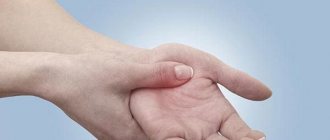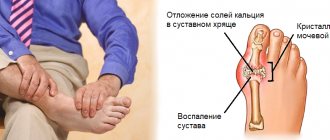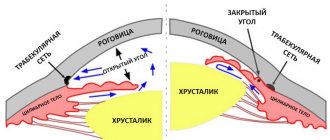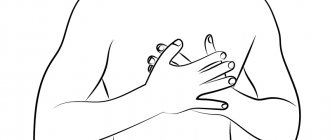- Home >
- Symptoms >
- Pins and needles, goosebumps, numbness in hands
All sorts of unusual sensations in the hands - pins and needles, goosebumps running down the arm, burning, numbness - are called paresthesia in medicine. There are a lot of possible causes for this phenomenon, and therefore the treatment of pins and needles, goosebumps and other strange manifestations of various diseases is not universal.
Why do my hands go numb?
Doctors believe that if a person is young, the cause is in the nervous system, and if an elderly person, it is in the blood vessels or endocrine system.
Are common
In most cases, both hands may go numb due to illness.
Household
The reasons for numbness are simple - a person sat in an uncomfortable position, which pinched the nerves and blood vessels. This disrupted blood flow and impulse transmission. This occurs most often in the following cases:
- The man raised his arms above his chest.
- He was carrying a heavy bag.
- Wears tight clothes.
- Performs work manually.
- Sleeps on one side.
If negative factors are eliminated in a timely manner, the discomfort will also disappear. But if it becomes a habit, chronic diseases may appear.
Problems with the circulatory system
Blood enters the arms through the aortic arches, passing through the chest cavity. The following arteries are found in the arm:
- Radial.
- Elbow.
- Palmar.
There are many small vessels in the palm. And if some stop functioning, others replace them. If the body is healthy, sensitivity will be restored quickly.
But if pathologies are present, some symptoms last a long time. Vascular thrombosis is considered a dangerous disease. If the blood clot is in the artery that supplies the arm, the person will lose sensation from the fingers to the entire arm.
Numbness may result from vascular aneurysms. These are small formations that fill with blood, pinching the nerves. Another disease is vasopathy or angiopathy. The tone of the vascular walls decreases, the lumen narrows, and blood circulation is disrupted. This causes ischemia. The tissues that feed from these vessels lack oxygen.
Lack of vitamins
Numbness may occur if the body does not have enough vitamin B or minerals. At the same time, a person quickly gets tired, and his memory deteriorates. And if there is not enough vitamin A and E, the performance of bone marrow cells is impaired, and the development of red blood cells and other blood cells slows down.
Atherosclerosis
This is a disease in which cholesterol accumulates in the blood vessels. Lipids do not allow normal blood circulation. The symptoms of the disease are as follows:
- Cramps when relaxing.
- Insomnia.
- Itching and burning.
Hands look pale and nails become thicker. Hair density decreases.
Raynaud's disease
A common disease in women. The small arteries of both arms are affected. The disease usually occurs in car drivers and pianists.
Numbness appears as a result of spasms in the blood vessels. The skin turns pale, becomes colder, and sensitivity worsens. As soon as the spasm passes, the skin returns to its original state. But relapses are possible, sometimes every day.
Herniated discs
This can also be a cause of numbness. If a person experiences numbness in his fingers, changes occur in the neck area. There are signs by which a hernia can be identified:
- Arms and shoulders hurt.
- Blood pressure rises.
- My head is spinning.
Metabolism problems
Typically the causes are the following diseases:
- Diabetes.
- Cholesterol deposition.
- Lack of calcium and potassium.
In the latter case, bruises appear on the person’s body, and the wounds do not heal well.
Nerve problems
The hands have many nerves that control sensation. The system contains the following nerves:
- Elbows.
- Radiation.
- Musculocutaneous.
- Axillary.
- Median.
If nerve function is impaired, impulses are transmitted more slowly. There may also be pain in the arm or a burning sensation.
Carpal tunnel syndrome
Neuralgic disease, when the fingers go numb and the hand hurts. The cause of the disease is compression of the median nerve between the elements that form the wrist and hand. Often found in older women.
Diabetic neuropathy
Another disease that causes numbness in your hands is diabetes. At the same time, a person may feel tingling in the limbs, cramps, and muscle weakness. Sometimes severe pain appears in the muscles, similar to an electric shock.
Osteochondrosis
When the spinal cord nerves are compressed, numbness may occur.
Stroke
If a cerebral artery ruptures or thrombosis occurs, there is a risk of stroke. Usually a person loses sensitivity in the limb for which the damaged hemisphere is responsible. First, the little finger and ring finger go numb. A stroke can also be identified by other symptoms:
- Muscle weakness.
- Difficulty breathing.
- Incomprehensible speech.
- Deterioration in coordination of movements.
- Dizziness.
- Increased pressure.
- Numbness of fingers.
A numbness in the finger may also indicate an illness:
- Little finger of the left hand – heart problems, for example, heart failure.
- Unnamed - compression of the nerves in the elbow area. Perhaps they are injured.
- Thumb. Osteochondrosis or vitamin deficiency.
- Pointing. Diabetes mellitus, joint inflammation or diseases of the endocrine system.
- Average. Raynaud's disease or spinal diseases.
Numbness can also occur with fungal infections.
Chronic kidney disease
Uremia may develop if the kidneys are affected. Toxins begin to accumulate in the blood, which affects the nerves. As a result, the limbs go numb. If the disease is advanced, only an organ transplant will help.
Injury
Hand numbness can occur after injury:
- Tendon rupture.
- Stretching.
- Fracture.
Injuries usually result from frostbite or shock. Blood circulation is disrupted, which leads to symptoms.
Other diseases
There are other diseases that can cause numbness in the hands. For example, HIV, which activates an infection that affects the nerves.
Causes of numbness in limbs
Numbness of the limbs can occur due to pathological processes in the peripheral nerves, in the presence of disorders in the spinal cord and brain. Numbness can occur with:
- Vasculitis or stroke, they worsen, block the blood supply to the nerves.
- Injury or neuropathy of the sensory pathway.
- Compression on any part of the route.
- Nerve infections (leprosy, HIV, Lyme disease).
- Inflammation or destruction of the outer layer of nerves.
- Metabolic disorders (diabetes, heavy metal or toxin poisoning).
It is also worth paying attention to excessive pressure on the nerves, repeated for a long time, for example, crossed legs when sitting. Narrowing of the lumen in the spinal canal, osteoarthritis, damage to the intervertebral discs. Pressure near the spinal cord due to a tumor, hematoma, or damage to the spinal cord due to trauma. Only a neurologist can more accurately determine the cause of numbness. The following are common causes of numbness in body parts:
- The head area and areas of the face may become numb due to: fungal infection, glossopharyngeal neuralgia, herpes zoster, trigeminal neuralgia, stroke, migraine and osteochondrosis.
- The torso area becomes numb in the presence of: suspicion of radiculitis, intercostal neuralgia, coronary heart disease, pathologies of the genitourinary system, kyphosis.
- Hands may go numb due to: diseases of the spine, diabetes and intoxication, disturbances in the functioning of the heart.
- Fingers may go numb due to: a hernia in the spine, hand injury, heart disease, carpal tunnel syndrome.
- Legs and toes go numb with: the presence of hernias, cauda equina syndrome, osteochondrosis and pinched sciatic nerve. Various types of varicose veins, atherosclerosis and arthritis may be present.
Numbness of the left hand
Paresthesias are very dangerous, since they can appear due to diseases of the cardiovascular system.
Pre-infarction state
The left arm may go numb if a person has angina. The provoking factors are as follows:
- Smoking.
- Wrong nutrition.
- Stress.
- Fatty and spicy foods.
The symptom begins with the ring finger. Then he moves to the little finger.
There are other symptoms that may indicate a pre-infarction condition:
- Pain in the heart, radiating to the collarbone or jaw.
- Anxiety, cold sweat, fear of death.
- Weakness.
- Insomnia.
- Dizziness.
Preventing finger numbness
As with most neurological diseases, preventive measures boil down to the following:
- Maintain an active lifestyle. Do exercises and don’t forget about daily physical activity;
- Listen to your body and undergo timely medical examinations to identify pathology at an early stage;
- Periodically get tested and undergo examination of the vascular system;
- Try to eat healthy and balanced. Don't forget to take your vitamins.
The main thing to remember is that the body always warns in advance about changes, and does not suddenly get sick. Few people notice problems that are just beginning; most often they do not pay attention to it, hoping that everything will go away on its own. Lack of time, fear of doctors and injections, reduction of the importance of what is happening ultimately lead to the disease becoming much worse, treatment time taking much longer, or the consequences can cost lives.
How to treat numbness
First, the doctor must do an examination. It's best to see a therapist. Tests are ordered. Depending on the results, the patient may be referred to one of the following specialists:
- Neuropathologist.
- Endocrinologist.
- Phlebologist.
After this, accurate diagnostics are performed in the form of MRI, electrocardiogram and x-ray.
Treatment also depends on the source of the disease. If the pathology is associated with the musculoskeletal system, massage and therapeutic baths are prescribed. Medicines also prescribed:
- Gel, ointment or cream.
- Painkiller.
- Anti-inflammatory drugs that do not contain steroids.
If the cause of numbness is a lack of vitamins, it is necessary to take a series of vitamins and minerals based on the elements that the body needs.
Note! Some vitamins should only be taken in combination with others.
Traditional therapy can also be effective; it complements the main treatment. For example, for kidney disease and diabetes, a diet is prescribed, and for injuries, immobilization is prescribed.
Treatment of pins and needles and goosebumps in the hands at the MART clinic
Goosebumps in the hands, pins and needles, numbness and other similar sensations in the hands, as a rule, indicate the presence of serious disorders in the body. Some of them can even be dangerous, and therefore you should not try to solve the existing problem yourself or using traditional methods. Prescribing the necessary treatment for goosebumps, burning sensations, pins and needles and other discomforting sensations in the right or left hand is possible only after determining the exact cause of their occurrence.
To identify the cause of paresthesia in the hands, it is necessary to undergo a thorough examination, which is recommended to begin with a visit to a neurologist. Effective treatment can only be prescribed by a doctor based on examination and additional research methods: laboratory tests, ECG, MRI, ultrasound.
At the MART medical center, treatment courses for pins and needles in the fingers and goosebumps in the hands are selected individually. If osteochondrosis or other neurological pathologies are detected, manual therapy, therapeutic massage and regular exercise therapy are prescribed. Physiotherapeutic procedures and reflexology are also used to restore normal sensitivity in the hand.
Sign up at the MART medical center in St. Petersburg (see map) by phone, or leave a request on the website.
Emergency
You need to pay attention to numbness in your hand, especially if it happens suddenly. This may be a signal of a dangerous illness - thrombosis, stroke or heart attack. There are signs that may indicate the likelihood of these diseases:
- The numbness is constantly increasing.
- The pain in the arm intensifies.
- Increases blood pressure.
- Speech is impaired.
- Facial asymmetry.
- Paralysis.
- Pain radiating to the jaw and back.
- Feeling of tightness in the chest.
- Dyspnea.
- Nausea and vomiting.
Treatment
Help before diagnosis
To prevent episodes of tingling in the hands, the patient is advised not to overload the hands and take breaks from monotonous work. For those who have to work at a computer all day, there are special palm rests and computer armrests that relieve some of the stress. It is necessary to avoid sudden overheating or hypothermia of the hands, so as not to provoke vascular spasm.
Conservative therapy
Tingling is generally mild or moderate, so symptomatic treatment with analgesics is usually not necessary. For sharp stabbing pains, it may be necessary to take systemic painkillers or administer local anesthetics (therapeutic blockades). Complex therapy is selected taking into account the etiology of the disease. The following groups of drugs are used:
- Calcium antagonists
. Recommended for expanding the lumen of blood vessels, which plays a decisive role in the treatment of Raynaud's disease. If they are ineffective, treatment is enhanced with ACE inhibitors and selective serotonin receptor blockers. - Antiplatelet agents
. They improve blood flow in peripheral arteries and capillaries, reduce the phenomena of vasospasm and ischemia of the hands. Medicines help reduce the frequency of attacks in those suffering from Raynaud's syndrome and prevent complications of the disease. - Anti-inflammatory drugs
. Exacerbations of neuropathies require the use of non-steroidal anti-inflammatory drugs, which eliminate pain and swelling and eliminate discomfort. In severe cases, therapy is supplemented with systemic corticosteroids. - Sedatives
. For neurotic disorders, herbal and synthetic sedatives are effective, they stabilize the patient’s emotional background. Occasionally tranquilizers and antidepressants are used. - Vitamins
. For vitamin B12 deficiency, cyanocobalamin is administered parenterally, which quickly eliminates tingling in the hands and paresthesia. For neuropathies and intervertebral hernia, other B vitamins (thiamine, pyridoxine) have a good effect.
In the treatment of neuropathies, targeted administration of drugs into the affected area is effective, which is carried out through electrophoresis and phonophoresis. After clinical improvement and disappearance of stabbing pain, mud therapy, electrical myostimulation, and myofascial massage of the hand are prescribed. Physical therapy is needed to restore nerve function and improve muscle strength.









